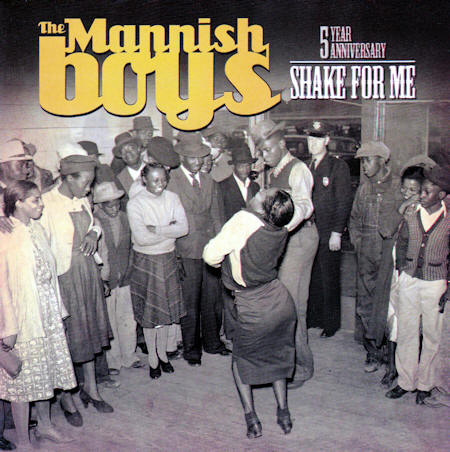
Painting © 2004 Loz
Arkle
Website
© Copyright 2000-2011 Alan White - All
Rights Reserved
Site optimised for Microsoft Internet Explorer



Early Blues Interview
|
|
2010 marks the 5th anniversary of Delta Groove Music and The Mannish Boys, for whom the label was originally conceived. To mark the occasion I had the opportunity of interviewing Randy Chortkoff, CEO of Delta Groove and Eclecto Groove Records and founding member of The Mannish Boys.
Randy: Yes, my father was a jazz fan and somehow made friends with Louis Armstrong at one of Louis’ gigs. Louis would contact my dad and his friend Abe whenever he was coming to Los Angeles. Louis would bring his wife and some of his band members to our house or Abe’s house, mostly to just eat, drink and party. I’m sure that he would bring his horn because I have pictures of the whole gang having a good time and Louis would be holding his horn in some of the pictures. I was only 5, 6 and maybe 7-years-old at the time so I would be sent to bed long before the party started. I have one picture of me and Louis at a motel in Lake Tahoe (many great jazz artists played clubs and hotels in Lake Tahoe back in the 1940’s and 1950’s) but again, I was too young to see these shows. I heard lots of jazz music played from my dad’s stereo. Mostly Louis Armstrong, Louis Prima and others like Joe Liggins and his Honey Drippers. I’m not sure if this is why I had a passion for mostly black music or not. I do know that as I grew older I was always drawn to the black music of the 50’s, 60’s and continued to enjoy blues and soul music through the years. When kids my age were listening to rock and roll (Beatles, Rolling Stones etc.) I liked that music but was drawn more to the Doo Wop groups of that period and singers like James Brown, Sam Cook or Ray Charles. Alan: As a teenager, what was the blues scene like in California at that time? Randy: I lived a few blocks from a coffee house/music venue called The Ash Grove. Ed Pearl who owned the place booked a lot of blues during the 1960’s. There was no age limit to go in there and I liked the sound that was coming out of the place. I got to see a lot of Delta blues artists as well as Chicago Blues artists. I saw Sonny Terry and Brownie McGhee, Lightnin' Hopkins as well as Muddy Waters, Taj Mahal and Howlin' Wolf just to name a few. Also there were clubs in Los Angeles that booked Albert Collins, Slim Harpo and other popular blues artists at that time. I left for San Francisco when I was 16-years-old and went to the Fillmore Auditorium as well as the Avalon Ballroom and other smaller clubs who allowed teenagers. I saw all the great English bands who were highly influenced by American blues artists like early Fleetwood Mac and The Cream, Jimi Hendrix and Savoy Brown. I had the pleasure of seeing T-Bone Walker, Jimmy Reed, B.B. and Albert King, Junior Wells and Buddy Guy as well as the San Francisco bands that were playing a kind of psychedelic blues. California had it’s own blues bands like Canned Heat and others. Alan: What do you remember of seeing Muddy Waters, Albert King, Freddy King and Jimmy Read perform live in the 60's? Randy: Unfortunately, I never got to see Freddy King live but I did see Muddy, Jimmy Reed and Albert King. I was fastinated by these live acts. Jimmy Reed was always interesting because you never knew what would happen. Often his wife would sit besides him and whisper the lyrics to the songs in his ear as well as making sure he stayed put in his chair! Muddy was powerful and always did something crazy during his show like put a beer bottle down his pants, shake it up and while doing the song “I’m A Man”… pop the cap off the bottle and let the foam fly all over the place! Muddy always had a great band and great harmonica players with him. I loved harmonica and got to see Muddy with George Smith, James Cotton and Paul Oscher. I saw Albert King in San Francisco several times and believe me, no one wanted to follow his show… he was just that good! I had the pleasure of producing Albert King’s last show in Los Angeles before he passed away. He liked to carry a derringer in his inside suit pocket! Albert Collins was a great live act… I think he was one of the first I saw travelling through the audience with an extra long guitar cord. Of course Buddy Guy used to go outside the club and play in the street! In Los Angeles we had so many great blues artists who I got to see play like PeeWee Crayton, Joe Turner, Big Mama Thornton, Lowell Fulsom, Smokey Wilson, Shakey Jake, Johnny Otis, Etta James, and my dad was amazed when my little blues band opened for Joe Liggins and his Honey Drippers. Alan: How did you get started as a musician?
Alan: What kind of material were you playing in the early days? Randy: I was playing the music that was popular at the time. Mostly copy stuff from the Fabulous Thunderbirds and ZZ Top! I did some Jimmy Reed, James Cotton and a bit of Sonny boy 1 (Rice Miller). I also liked the early Billy Boy Arnold stuff but I was afraid to tackle Little Walter… still am!! I tried to keep it simple and the style of Junior Parker was something I felt that I could do well and liked a great deal. Alan: What attracted you to get involved in producing records? Randy: I was working with a great singer named King Ernest who was living in Los Angeles but was playing in Chicago in the 1960’s and 1970’s. We needed a recording to send to clubs and festivals so I scrapped up enough money to produce a 12 song album. I got lucky and sold it to Evidence Music (a label out of the east coast that was very popular at the time) and we started playing here and in Holland. Then I hired Billy Boy Arnold to play at one of my Little Walter festivals in L.A. Later we rehearsed in my living room and I produced an album on Billy Boy. Again I was lucky enough to have it released on Alligator Records in 1993. I brought Finis Tasby into the studio and produced a great album on him. That one came out on Evidence. I was fortunate to have a great many excellent musicians play on these recordings. That’s how it started.
Randy: One of my all time favourite songs was “Wish You Would” by Billy Boy on VeeJay Records in the 1950’s. I was introduced to Billy Boy by Luther Tucker and Dave Myers who played at one time with Little Walter. Billy Boy had not done any recording in a long time and now I had a chance to record an album with one of my idols. I had very little money but the great musicians who played on the album also relished the chance to play with Billy Boy… We rehearsed in my living room and recorded the project in about a week… start to finish. I sent it to Bruce Iglauer at Alligator and he liked it. The only regret I have is that it got remixed by Bruce and Julian Herzfeld in Chicago. It was originally mixed in Los Angeles by myself and Glenn Nishida at Pacifica Studios. Still, I feel that it is some of Billy Boy’s best work and it started a great relationship with Alligator and Billy Boy. Alan: How did the Delta Groove Productions label come about? Randy: I had produced two wonderful albums with Kirk Fletcher and Franck (Paris Slim) Goldwasser… I followed that up with the first Mannish Boys album but when I shopped them I couldn’t find a taker! That’s when I decided to put them out myself. I leased the rights to Kirk and Franck’s CD’s to the Cross Cut label in Germany and recorded Mitch Kashmar’s first album “Nickels and Dimes” here and those were Delta’s first releases… Soon came the first Rod Piazza and the Mighty Flyers double CD/DVD “For the Chosen Who”… The rest is history. We owe it all to the fans who liked the music.
Randy: Well that project was done with only the thrill and excitement of getting some of my favourite musicians together and having fun. I had no idea it would evolve into what it is today. I called two of my favourite drummers and bass players (June Core and Ronnie James Weber) then called in a couple of my favourite front men (Finis Tasby and Johnny Dyer) two great guitar players (Kirk Fletcher and Franck Goldwasser) a great old school piano player (Leon Blue) and we had a band! I threw in some special guests to round out the stew (Paul Oscher, Mickey Champion and Roy Gains… I produced it and blew some harp and my cousin Josh Temkin was a huge help doing co-production and all the art and photos. I had no idea that it would be nominated for traditional blues album of the year by the Blues Foundation then called the W.C. Handy Awards. People wanted to see the band live so because June Core was working with Charlie Musslewhite and Ronnie James Weber was with the Fabulous Thunderbirds, I asked one of the greatest blues drummers in the world (Richard Innes) and my good friend and veteran bass player Tom Leavey) to join the band… because Kirk Fletcher was also playing with Kim Wilson and the Thunderbirds, I asked my old friend and monster guitar player (Kid Ramos) to join up. We started touring with those individuals and the live act turned out great. The Mannish Boys live CD “Live and in Demand” was a result of this touring line up. Alan: The Mannish Boys are clearly a 'supergroup' of blues legends, musicians who have played with the greats of the past. Tell me a little about the ethos of the band and the blues roots that the band draws from. Randy: Well, our latest (5th) CD has a new rhythm section… You couldn’t ask for much better then Richard Innes, Ronnie Weber or Tom Leavey. So I had to really dig deep! Jimi Bott our new drummer has had a fantastic history. It would take too long to name all of the great artists Jimi has played with. Let’s just say that almost a decade with Rod Piazza as a Mighty Flyer and years with The Fabulous Thunderbirds should say it all. Willie J. Cambell has played bass for the best in the business, most notably with the great James Harman band and of course The Fabulous Thunderbirds. The addition of Bobby Jones (on the last three albums and touring with the band for a couple of years now) who has performed all over Chicago as lead singer with the greatest musicians of all time during Chicago’s golden blues years. Kirk and Franck are the perfect match… their guitars playing off of each other is as close to blues heaven as you can get. The band draws it’s music from the very best of Chicago, West Coast, Texas and Delta roots, yet they have an original sound all their own. Alan: The Mannish Boys have been dubbed the 'one band blues festival', why is this? Randy: The Mannish Boys live show is more of a review than a band playing a set of blues and roots music. Each player is a soloist in his own right. Each member takes turns at the front of the band similar to what we would have seen if we had gone to an early Ike Turner or Johnny Otis review in the 1950’s. Each member is spot lighted during the live set. Even the drummer and bass player take a turn in the spot light and there are four singers, five when Johnny Dyer comes along! That’s what I would call a one set blues festival… but then, I’m the biggest fan of these guys so don’t take my word for it, come and check out The Mannish Boys yourself!
Alan: You have now branched out to cover other music styles with the formation of Eclecto Groove Records; keeping Delta Groove true to its blues roots. How is the new label developing? Randy: I didn’t want to upset the purity of the traditional aspect of the Delta Groove label so we created Eclecto Groove… meaning eclectic music with soulful roots. So far I think that we have chosen some really great artists for the Eclecto Groove label. When People Magazine gives your latest artist (Nick Curran) the near highest review rating, we know that we may be on the right track. Kirk Fletcher’s newest is such a diverse mixture of fantastic music, it had to be on Eclecto Groove. Alan: Who are your favourite blues artists (both old and new)? Randy: Honestly, there are just too many to mention. I will say that I am a big fan of John Nemeth and Curtis Salgado but there are so many new artists that amaze me I can’t mention them all. As far as the past goes… wow, it would take up a whole book starting with guitar players like T-Bone Walker, B.B. King, Jimmy Rogers and Luther Tucker to the new kid on the block (Shawn Starsky from Jason Ritchie’s band) a guy to watch out for! Then there is Little Walter, Muddy and the Wolf… Have you got another 24 hours? Alan: Who has influenced you the most in your music writing and playing? Randy: Just too many to mention… I write as if I was from a poor black family in a previous life! Alan: Are there any particular songs that you play that have special meaning to you? Randy: Well, I have been playing the same worn out songs for so many years that even I am getting tired of them! I’m a big fan of Jimmy Reed (first black blues I ever heard) and I think that I really have my own style of playing. I do have a song on our newest CD ‘Shake for Me’ that has special meaning. It’s called “Educated Ways” and one that I wrote for Jody Williams to sing on our CD ‘Big Plans’ called “Young and Tender.” Alan: I understand you are also involved in the production of feature films. How does this fit in with your passion for the blues? Randy: I get to use some of the money I have made in film to satisfy my passion for blues. We did get a Mannish Boys song, a Mitch Kashmar song and an Etta James song into one of our films. But a lot has changed in the last year or so… I think I will have to survive by playing first position Jimmy Reed notes on a harmonica till the economy recovers! Alan: The Mannish Boys latest release 'Shake For Me' marks the fifth anniversary of the band and the Delta Groove label. Tell me about the making of the album, how the songs were selected, and how the album was produced? Randy: Good question… I was going through some health issues during the time ‘Shake for Me’ was recorded. Jeff Fleenor who has worked for the label many years had to cover for me in the studio. Jeff and I chose the material and in the past I have tried to record as much in old school analog as possible. Jeff took over the production chair for ‘Shake for Me’ and along with our engineer Preston, Jeff did it all. I spent maybe two days in the studio and Jeff did the entire album digital. He and Preston mixed it and all I did was play some harp and listen to the mixes. I asked for a few changes but Jeff did a ton of editing, mixing and over all producing. The sound is warm and fat and almost sounds like it was done at Chess Sun studios on tape! Personally, I think that it’s the best Mannish Boys CD to date and Jeff deserves all the credit… well, ok I guess the musicians deserve some major credit too! Jeff should be nominated producer of the year!! Alan: Are we likely to see The Mannish Boys in the UK or Europe soon?
Randy: We leave for Holland May 6th and play at
the 25th anniversary for the Moulin Blues Festival in Ospel Holland.
There are other dates scheduled for Europe this year but nothing in the
UK. We would love to play the UK so have your fans contact
www.fesivalsexclusive.com and hopefully
we can come to the UK someday soon. Alan: Some music styles may be fads but the blues is always with us. Why do you think that is? Randy: Like Willie Dixon once said “The blues are the roots of all American music and the rest are the fruits” Someone also said (I think it was Muddy Waters) “The blues had a baby and they called it rock and roll.” Alan: How do you see the future of blues music? Randy: Good I hope or I won’t be eating much! Seriously, if so many young people could feel the blues back when blues records were selling in the millions, why can’t they feel it now? I think it is because they just aren’t exposed to it… So thank you for doing your part to expose more people to this heart and soul felt art form. Like Albert King once said “If you can’t dig this music, then you got a hole in your soul!” We need another British invasion! Alan: Thank you so much Randy, I really appreciate your time.
Alan White
www.deltagrooveproductions.com
Return to
Blues Interviews List |






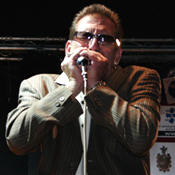 Alan:
I believe your passion for music started when you were young, with
Louis Armstrong coming round for dinner and having informal jam
sessions. Do you recall those sessions?
Alan:
I believe your passion for music started when you were young, with
Louis Armstrong coming round for dinner and having informal jam
sessions. Do you recall those sessions? 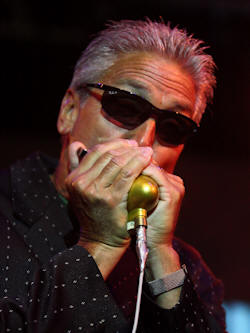 Randy:
Just fooling around with a harmonica playing along with records. Then
sitting in with friends’ bands and finally I talked some musician
friends into starting a band with me. I sang and played harp and we
were terrible! But I managed to book small gigs around town. Finally
about 25 years ago I met Rod Piazza and he helped me understand more
about what the real blues music was all about. He made me tapes of all
the Little Walter recordings and some early Junior Wells, James Cotton,
George Smith, Big Walter Horton and both Sonny Boy 1 and 2. He gave me
the first recording of The Hollywood Fats Band and told me how good he
thought Al Blake was. I put together a band with Debbie Davies and Alex
Shultz. It’s a wonder that they even considered playing with me
considering how bad I was! I still haven’t the patience to truly learn
the harmonica but I guess I get by.
Randy:
Just fooling around with a harmonica playing along with records. Then
sitting in with friends’ bands and finally I talked some musician
friends into starting a band with me. I sang and played harp and we
were terrible! But I managed to book small gigs around town. Finally
about 25 years ago I met Rod Piazza and he helped me understand more
about what the real blues music was all about. He made me tapes of all
the Little Walter recordings and some early Junior Wells, James Cotton,
George Smith, Big Walter Horton and both Sonny Boy 1 and 2. He gave me
the first recording of The Hollywood Fats Band and told me how good he
thought Al Blake was. I put together a band with Debbie Davies and Alex
Shultz. It’s a wonder that they even considered playing with me
considering how bad I was! I still haven’t the patience to truly learn
the harmonica but I guess I get by. 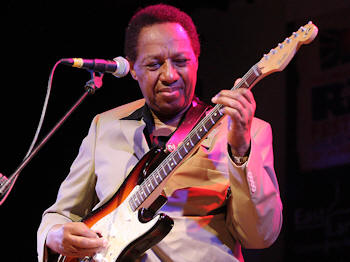 Alan:
Your first project as a producer was with Billy Boy Arnold which I
believe was the highly acclaimed comeback release 'Back Where I
Belong'. Tell me a little about it.
Alan:
Your first project as a producer was with Billy Boy Arnold which I
believe was the highly acclaimed comeback release 'Back Where I
Belong'. Tell me a little about it.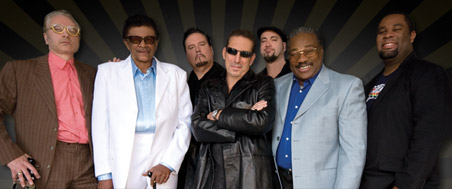 Alan:
Following the formation of Delta Groove, The Mannish Boys were born.
Tell me how the band got together and how the band is evolving.
Alan:
Following the formation of Delta Groove, The Mannish Boys were born.
Tell me how the band got together and how the band is evolving. 
